By Brian Hibbs
If this has more typos than usual, or things just don’t make any damn sense, please let me apologize – about ten days ago I apparently slipped on a plastic Amazon envelope when I was visiting a friend’s house and pitched down a flight of ten stone stairs, breaking my wrist, and giving me a concussion, and needing twenty stitches in my forehead – I don’t actually remember any of this happening, but I’m told that’s why I woke up in a hospital, at least. My brain was bleeding, yay! I am still spinny and having weird spoonerization problems and can only sleep in weird little spurts, but damn it, I have a responsibility to report on the New Era (“part one” is here)…
As I start to write this, we’ve just had the first shipment of Marvel comics from their new relationship with Penguin Random House (PRH), and however bad we thought it might be, it sadly was even worse for many many retailers. But let me lay some ground work first here, if you don’t mind.

The thing is, periodical comics are not books. They have a ton in common, to be sure – they are both printed on paper, and both go on sale every week, and both have stores dedicated to them, and even celebrity authors… but after that, similarities start to dramatically fade. As a super-general rule, books are perennial objects that will eventually sell and are largely divorced from specific release date, while periodicals are much more akin to milk with a small viable sales window. More than that, a fairly large percentage of periodical buyers are deeply concerned about condition in a way that renders many periodicals largely unsalable if they’re not in perfect condition: this behavior is something that publishers like Marvel clearly encourage, leverage and exploit given just how much of their business model revolves around selling low print-run variant covers.
I knew there were a lot of variants at Marvel, but I hadn’t really considered it in total before specifically looking at it for this column. I looked at the newest catalog (October 2021, for [mostly] December 2021 shipping books), and was completely stunned to find that of the sixty-seven solicited new comic books, there was just one (“Savage Avengers” #27) that is being offered with only a single cover! Otherwise, there are a staggering two hundred and thirty covers being solicited for those sixty-seven comics, for an average of 3.4 covers per book (!!!). That’s pretty insane, and this publishing tactic helps to explain from where much of the consumer behavior which we now see has evolved.
For good or for ill (and I would argue the latter) much of the consumer interest in many periodical comics has started to revolve around short print runs and high-grade copies and “first appearances” by new characters, more than it has the actual content that appears within the pages. There are apps dedicated just around appearances and print runs, and Marvel has leaned perhaps the hardest of any publisher into this mire. But the core and critical part of making that thoroughly taught behavior work is that the comics have to be in “perfect” condition for the consumer to purchase. If they’re not “mint”, then they’re simply not going to sell to that “collector” market. At all.
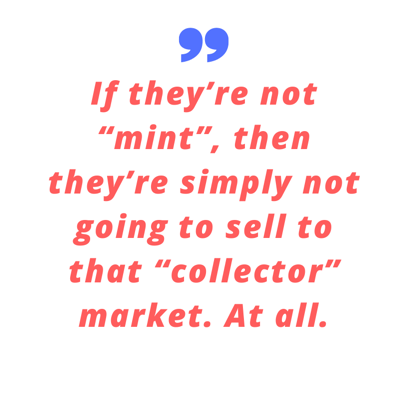
PRH is certainly aware of the importance of condition, and this was one of the hardest-hit talking points they presented to us again and again in the initial PR campaign. For example, the video that is posted at Marvel.com introducing this new distribution relationship, (all emphasis is mine) PRH’s Tyne Hunter says at roughly 10:25: “We are also introducing new packaging for comics because we want to minimize damages to what we know is a collectible product for you guys. That said, damages can happen; we try to minimize them (and) we do our absolute best to make sure we can keep them very low, but we also understand they can happen. And when they do happen, we want you guys to know that we are dedicated to support this market, at every level: sales, customer service, shipping, etc. So when you guys encounter a damage, let us know; we have a process in place for how we can rectify this as efficiently and as smoothly as possible, to minimize disruption for both you and your customers. So just contact us: we’ll get it squared away!”
Or from the PDF that PRH sent out all the way back in March 2021
“29. Will comic books be handled differently than graphic novels and other book product?
Yes. Because of the delicate and collectible nature of comics we will be using our warehouse in Hampstead, Maryland to process comic book orders. In order to minimize damages, comics will not ship with graphic novels or other book product.
30. What if I receive product that is damaged or an incorrect quantity?
Claims for damaged or defective product must be submitted within ten calendar days of receipt of product. Claims can be processed on the self-service.BIZ site and can also be placed via Customer Service.”
The point is that PRH, from the instant that they announced this, have been well aware that our product is both “collectible” and “delicate”, and they have messaged their concern and understanding for this many times and more as we’ve led up to the start of this relationship.
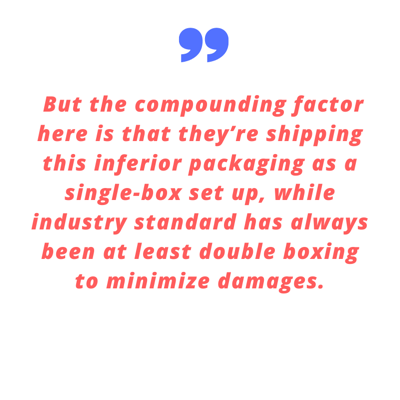
I will even tell you this story out of school: there is a retailer just a few miles from PRH’s new “comics warehouse” who took the time to invite a whole raft of PRH executives and functionaries into his store where he personally demonstrated the various types of packing material in use, walked through the pros and cons of each, demonstrated typical damages and so on and so forth. Said retailer? Reports that he received 100% damages on his first shipment despite this effort – absolutely every book he received in the first week rendered unsalable!
I took a wholly unscientific poll on a private retailer group on Facebook about our collective results, and a staggering forty-five percent of respondents reported damages greater than “normal” (there is a 1.5% damage allowance built-in to Diamond’s system). Two thirds of those reported up to thirty percent of their comics as being unsalable, and nearly twenty percent say over a third of their shipment as destroyed. Those are flabbergasting numbers, in the face of the time and effort and communications that have been passed on to PRH, and in a sharp blow to confidence and morale, of the folks who reported acceptable shipments roughly a third of those said they expected they were just “lucky”, and it’s just a matter of time before they too get the punch from UPS’ ability to properly handle thin boxes.
(For the record, my first-week damage rate from PRH was 8.8% — roughly nine times higher than what Diamond typically yields for us, and I’m one of the “lucky” ones.)
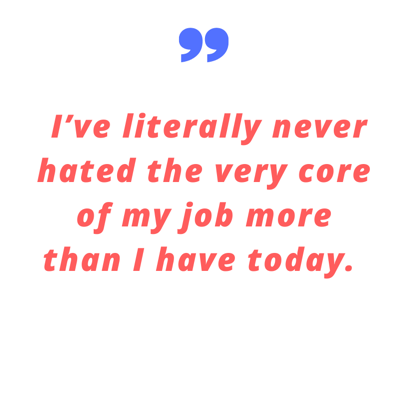
Here’s my quintessential problem with everything that has happened with distribution lately: because we’re now forced to use three different distributors to receive periodical products – three different sources that all have different physical systems, reporting and ordering procedures, mind you – the amount of labor in ordering, receiving and processing that this scales up on four dollar cover price items means that new periodical comics are quickly becoming the least profitable item a “comic store” can possibly carry.
One wag on Facebook posted “My career as a comic retailer is over… I’m now a data entry/bills payable clerk.” And that’s not really very far from the truth. A year ago every periodical came at a single time in a single shipment (most often with all of one’s restock as well), and one could schedule staffing efficiently so that all the work could be done in one single wave each week. Now, we’re getting at least three different shipments, which come scattered throughout the week, with very little clarity of what and when we should expect. The worst example is Lunar’s dependance on FedEx, which seems physically incapable of delivering books consistently to many cities (seriously: some weeks they show the Thursday before on-sale date, and sometimes they show up on the Wednesday after, or maybe they show virtually any of the days in between….), but there are many many many stores in the United States which are closed on Mondays (so that the owner/operator can get a single day off each week), who can no longer do that because PRH is shipping for Monday delivery. Not to mention that PRH reorders ship entirely separately from new periodicals, and they’re coming from two distinct warehouses, so every reorder is split in two, coming on two different days, where you have to track the paperwork from the order over two distinct tracks.
All of this makes retailers less and less profitable.
And I haven’t even begun to touch topics like Final Order Cutoff (FOC) orders, which don’t function at PRH the way they have for the last sixteen years – FOC was designed so one can open and close and reopen orders as many times as one needs, but at PRH you can never lower orders once you’ve ever submitted it, absolutely throwing in the garbage the very notion of “initial” orders and being able to freely edit those through the final deadline. Nor does PRH have a single weekly page that allows one to order everything on FOC that week – you have to open multiple orders that are tied to the catalog month they were first offered in, causing many retailers to miss books on order because of this confusing process.
And, to make matters even worse, Marvel has suddenly decided to move FOC from three weeks in advance, to four, putting a much greater burden on the risk of retailers ordering periodicals. Up until this week, one would have the first week’s worth of rack sales on issue #1 to judge before your FOC was due on issue #2, but no longer. Now we have to order issue #2 entirely blindly, increasing risk, and virtually guaranteeing that we are going to get our orders wrong (one direction, or the other)
Or did we talk about invoicing? PRH packing lists come in gobbledygook character strings that are not at all apparent what they’re meant to refer to, especially if you carry any amount of variant covers (I generally don’t, so this is very mild looking example here). More than that, the packing lists have all kinds of data on them that are of literally zero value to an employee who is stuck with checking them in – things like “How much does it weigh?” (we don’t pay for shipping from PRH) and “How many copies are in a sealed case?” instead of putting things like “Here’s how many copies you are getting” in column one. Infuriating.

It’s just not fun to sell periodicals any longer – it is a nightmare of stress and contradictory systems and broken funnels of paperwork and package management. I’ve literally never hated the very core of my job more than I have today. And it does nothing but make it harder to sell comics, and so we’re mostly all going to sell less in the face of this stress and aggravation. The system has been broken, and it’s been broken by people sitting in offices who never have to sell a comic to any individual consumer themselves.
And the worst part of it, for me, is that PRH had six months to get this right before shipping a single book. Six months where scores of retailers worked tirelessly offering examples, offering suggestions, opening their internal systems for examination, spending endless hours writing essays or sitting on Zoom calls with PRH executives, and on and on and on. Hundreds and hundreds of person-hours were invested into trying to make this process as smooth and as potentially error-free as retailers could possibly make it… and at the end of all of that dedicated and focused effort, it certainly appears that ninety percent or more of our work was utterly wasted, as it was completely ignored up front and will have to be fixed now that we have a chaotic nightmare to live through.
This hurts my heart, and it hurts my soul, and it makes me wonder why we even tried, if they were so set upon not listening to us until after it was too late?
Here’s the thing: I (perhaps foolishly), think that eventually, someday, things will get mostly to where they need to be – all of the things my peers and myself were presenting have, shock and surprise!, turned out to be exactly and precisely true, and I do have enough faith in PRH that the size of the blowback is making them take this very very seriously, and they have the resources to make it right, in the end. But I know one thing for certain: you only have one opportunity to make a first impression, and PRH absolutely messed this up in a way that I would never have imagined given the massive collective effort by so many retailers to get them on the right page from the jump. From my vantage point it looks like hubris, like arrogance, like them thinking “Well, it’s pretty much basically like our core business of selling books”, when in fact they were told repeatedly just why it wasn’t any of those things at all.
The tragedy of it to me is just how many of my peers I see now seriously talking about retiring early, about reducing their footprint of new periodical comics; and just how much higher the barriers have been built for the younger retailers to enter or invest in the periodical marketplace. The only people who can succeed now are probably going to be the ones who focus nearly exclusively on maximizing revenue and collectability, and who have no specific loyalty to story or creators – and that’s all the opposite of what the market needs to succeed and to grow and to bring in new readers.
The art, the medium of comics has never ever been stronger.
But the business of retailing comics, of navigating the process in which material comes to market has never ever been bleaker or more fraught with peril.
**************************
Brian Hibbs has owned and operated Comix Experience in San Francisco since 1989, was a founding member of the Board of Directors of ComicsPRO, has sat on the Board of the Comic Book Legal Defense Fund, and has been an Eisner Award judge. Feel free to e-mail him with any comments. You can purchase two collections of the first Tilting at Windmills (originally serialized in Comics Retailer magazine) published by IDW Publishing, as well as find an archive of pre-CBR installments right here. Brian is also available to consult for your publishing or retailing program.


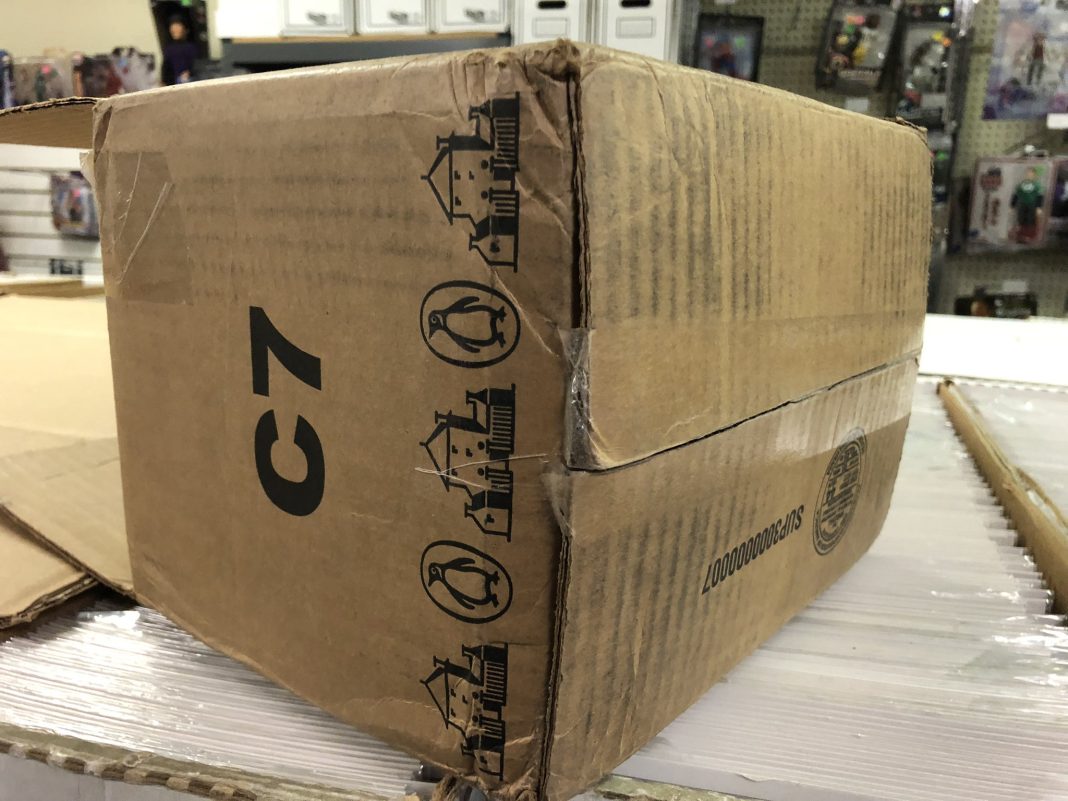

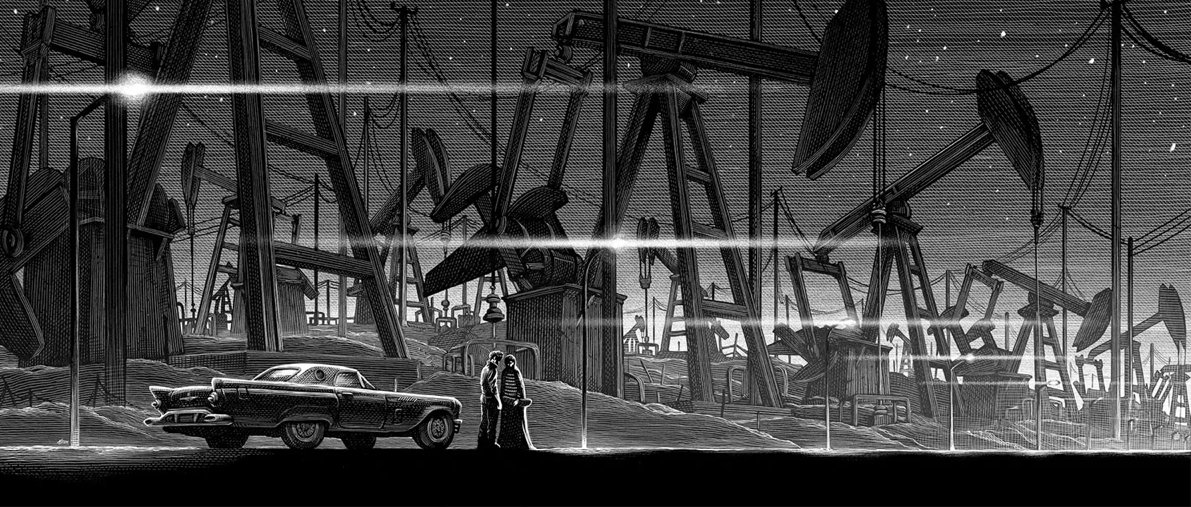



Post press-time update: Second week appears just as bad, according to chatter. My damages were 5.1% in frame two.. Diamond gets regularly castigated for poor shipping, and their average is (in my experience) under 1%
-B
What about the shipments of Marvel comics from Diamond? Were they sent to Diamond direct from the printer or did they go through the PRH system as well?
As UK retailers we are sampling PRH service to us over here, admittedly in a very small way, so far we have managed to get nothing here as the extra step of shipping to a freight forwarder seems to be causing major issues. 2 of our 3 trial orders didn’t even get picked. I’m not expecting them to turn up in great nick when they do. Personally I’m hoping our supply chain doesn’t change ’cause I can only see it being even less advantageous to us off in the international sticks (so to speak). Many people who have decried Diamond over the years are possibly finding out it was a pretty good service all along.
I stayed with Diamond. Not that it’s “Always Sunny in Diamond”, but my damages are almost nil, and I know what I am dealing with. Best of luck my friends in comics.
While I worked as an executive at Diamond almost 28 years, since RPH is now in the comics distribution business, I hope they can’t quickly address these issues ASAP, for the sake of the comic book specialty retailers
Brian, is there any possibility you’d bail on periodicals from either Marvel or DC? My local retailer (in business like 30+ years) told me last week he’s seriously considering getting out of new comics except for customers that reliably pre-order. Your store is probably one of those best built to be able to do that no?
Bill, Freudian slip?
@Chris: They appear to be sent on pallets from printer directly to Diamond. But discounts are DRAMATICALLY lower, so pretty non-viable for most stores.
@Luke H: We’re positioned to do without, in theory, but it would be a WICKED cut in cash flow (if not profit, and would probably mean firing some staff, so would be everything I would want to do to avoid.
Sounds like late-stage capitalism. I work in the supply chain. Historic increase and levels in units per hour + worker shortage + heading into the holidays. It’s not going to get better. For a while.
TBH, the decline is simple competence these days extends to many areas and is endemic. Calling it sad is a gross understatement.
Comments are closed.